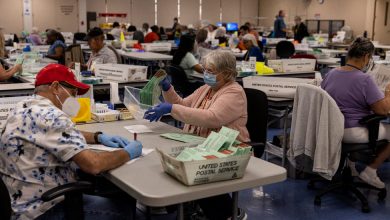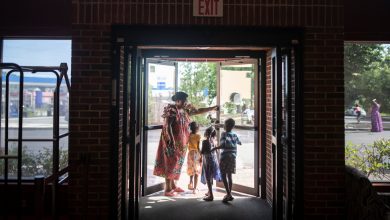Thanksgiving Will Cost More This Year. That Could Cost Democrats, Too.

AUBURN HILLS, Mich. — Samantha Martin, a single mother shopping ahead of Thanksgiving, lamented how rising gas and grocery prices have eaten away at the raise she got this year as a manager at McDonald’s.
Gas “is crazy out of hand,” Ms. Martin said as she returned a shopping cart at an Aldi discount market in Auburn Hills, a Detroit suburb, to collect a 25-cent deposit.
Her most recent fillup was $3.59 a gallon, about $1 more than the price in the spring. Her raise, to $16 an hour from $14, was “pretty good, but it’s still really hard to manage,” Ms. Martin said. “I got a raise just to have the gas go up, and that’s what my raise went to.”
Ms. Martin, 35, a political independent, doesn’t blame either party for inflation, but in a season of discontent, her disapproval fell more heavily on Democrats who run Washington. She voted for President Biden but is disappointed with him and his party. “I think I would probably give somebody else a shot,” she said.
As Americans go on the road this week to travel for family gatherings, the higher costs of driving and one of the most expensive meals of the year have alarmed Democrats, who fear that inflation may upend their electoral prospects in the midterms. Republicans are increasingly confident that a rising cost of living — the ultimate kitchen-table issue — will be the most salient factor in delivering a red wave in 2022.
Democrats’ passage in quick succession of the $1 trillion infrastructure law and, in the House, of a $2.2 trillion social safety net and climate bill, promise once-in-a-generation investments that Democratic candidates plan to run on next year, with many of the policies in the bills broadly popular.
But, despite rising wages and falling unemployment, Democrats are also in danger of being swept aside in a hostile political environment shaped in large part by the highest inflation in 30 years, which has defied early predictions that it would be short-lived as the country pulled out of the pandemic.
With control of Congress and many key governor seats at stake, Republicans are pointing to public and private surveys that show inflation is linked to Americans’ falling approval of Mr. Biden. And, given the wholesale gerrymanders drawn, particularly by Republicans, in the current round of congressional redistricting, the Democrats would face a high bar in keeping their paper-thin majority in the House of Representatives, even in a favorable environment.
The president’s recent tour of ports, bridges and auto plants — which was meant to promote the infrastructure legislation — was overshadowed in part by inflation anxieties. As he test drove an electric Hummer at a General Motors plant in Detroit this week, his message of a future of zero-emission vehicles was eclipsed by a present in which Americans are driving more miles in conventional vehicles, contributing to soaring gas prices.
Representative Elissa Slotkin, a Michigan Democrat in a vulnerable House district, wrote to Mr. Biden this week that inflation was the most pressing concern of her constituents. A former C.I.A. analyst in Iraq, she urged the president to pressure Saudi Arabia to increase oil output.
Ms. Slotkin, who won her seat in the midterm wave of 2018, is one of two Michigan Democrats in highly competitive districts that include the Detroit suburbs. In the Trump years, Democrats had mixed results in the populous region, advancing in white-collar communities but losing ground with their traditional union supporters.
In an interview, Ms. Slotkin said that during a recent visit home, she heard constantly about the high costs of gas and groceries, and experienced them herself. “I buy groceries, I drive a ton,” she said. “Thanksgiving week is going to be more expensive by a long shot than last Thanksgiving.”
She acknowledged the political peril that rising consumer prices could pose for her party if it continues next year. “Kitchen-table issues affect Michigan and the Midwest more than any other national issue going on in Washington,” she said.
In interviews with voters in suburban Detroit, including from Ms. Slotkin’s district and that of the second vulnerable Democrat, Representative Haley Stevens, residents almost universally acknowledged the pain of rising prices on their budgets. But it was unclear, from their accounts, that Democrats would suffer politically. Most voters ascribed blame according to their party leanings — as they do on almost all issues in an era of hyperpolarization.
Margie Kulaga of Hazel Park, a Trump voter in 2020, said she paid 49 cents a pound, up from 33 cents a pound last year, for a 23-pound turkey that she had just bought from a Kroger market. Prices for meat and eggs have risen by 11.9 percent in the Midwest from a year ago, according to the Bureau of Labor Statistics.
“I blame Biden, his whole administration,’’ Ms. Kulaga, 55, said. “I never used to cut coupons, but now I do.”
On the other hand, Gloria Bailey, 63, a special-education teacher who lives in the suburb of Redford, is a Biden supporter who said rising costs should not be laid at his doorstep.
“The coronavirus has affected a lot of shipments and deliveries and crops and drivers who bring the food to market,” she said.
This month, Republicans broadly advanced in elections across the country, especially in Virginia, prompting forecasts of a similar tide in 2022. Glenn Youngkin won the Virginia governorship after emphasizing the rights of parents to control how schools operate and what they teach.
But Mr. Youngkin’s chief strategist, Jeff Roe, said the “big takeaway” of the election was how the rising cost of living had significantly motivated voters, an issue that was little covered by the news media. He predicted it would drive Senate and House races around the country next year (many of which he and his firm have a hand in).
“The cost of living is too high, and they ascribe that pain to Democrats,” he said. “It just wasn’t this expensive when Trump was there — that’s what the voters think.”
Consumer prices in Michigan and the Midwest rose by 6.6 percent in October, more than the national average, compared with a year ago.
The causes are the same as what drives the national spike, the steepest in 31 years, economists say — high demand for goods by consumers spending again after the pandemic lockdown, and a global supply chain with lots of kinks still to be worked out. Gas prices are high partly because of a choke on production by the Organization of the Petroleum Exporting Countries.
Some economists — and many Republicans — blame Democrats’ $1.9 trillion Covid relief aid in the spring for overstimulating demand. They warn that Democrats’ new big spending measure, the Build Back Better plan, which targets struggling families and workers with the most substantive programs since the Great Society in the 1960s, will further push up prices.
The White House counters that inflation is tied to short-term bottlenecks in the supply chain; its major domestic spending, the administration said, will eventually tame inflation by making businesses and workers more productive.
Moody’s Analytics, an economic forecaster favored by the White House, predicted that if the Build Back Better plan passes (it is now in the Senate), it will slightly raise inflation in 2022, to 2.5 percent in the final quarter. That is close to the Federal Reserve’s target rate.
Still, predictions early this year by the Fed that inflation was “transitory” have not borne out.
In the meantime, Americans’ approval of Mr. Biden’s handling of the economy is falling. In a Quinnipiac University national poll released this past week, only 34 percent of Americans approved of the president’s handling of the economy.
The poll illustrated the dilemma for Democrats: strong majorities supported both the infrastructure law and the Build Back Better plan. But pluralities said they wanted to see Republicans gain control next year of the Senate and the House.
Although much could change in the economy and the political climate in a year, Republican strategists are urging their candidates to run hard against Democrats as the party of inflation.
“I believe it is the single biggest issue that affects the electorate,’’ said Dan Conston, the president of the Congressional Leadership Fund, a Republican super PAC that focuses on House races. “For a voter, it does not require them knowing every nuance of fiscal policy and how that relates to inflation. They are fundamentally feeling the pain already, and they have one group of people to blame for it: Democrats, who control all of Washington.”
One such potential voter is Jessica Bryen, a stay-at-home mother of two. “I consider myself a regular middle-of-the-road person, but I don’t like what’s going on right now,” she said. “Since Biden took office, things went up.”
Recently, Ms. Bryen and her husband, a government employee, moved from a townhouse and into a home they bought, straining their budget. Though she said she regularly voted in presidential elections, she sat out in 2020 because she didn’t like either candidate. She is undecided about which party should control Congress.
“Regular Middle America needs more care and concern,” she said. “Obviously, infrastructure’s important and climate’s important, but so are gas and homes and groceries.”



